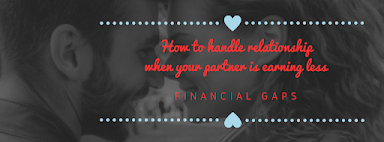Understanding the Financial Imbalance
Financial imbalance can often be a challenging aspect of any relationship. Acknowledging and addressing this issue is crucial in maintaining a healthy and harmonious partnership. In this article, I will discuss various strategies for handling relationship dynamics when there is an income gap and one partner is earning less than the other.
Acknowledge and Discuss the Financial Disparity
It is essential to open up a dialogue about the income disparity within your relationship. By acknowledging this difference, both partners can work towards understanding and supporting each other. Honest and respectful conversations about finances can help eliminate misunderstandings and prevent resentment from building up.
Open Communication about Financial Goals and Expectations
To navigate the income gap in a relationship, it is important to have open communication about financial goals and expectations. Each partner's aspirations and priorities should be discussed and taken into consideration. This allows for a better understanding of what each person hopes to achieve financially and can facilitate joint decision-making.
Explore the Emotional Aspects of Financial Inequality
Dealing with financial inequality in a relationship can have emotional implications for both partners. The individual earning less may experience feelings of inadequacy or dependency, while the higher-earning partner may face pressure or guilt. Openly discussing and validating these emotions is essential in order to foster a supportive and empathetic environment.
Navigating Shared Expenses
Shared expenses are often a significant aspect of any relationship. When there is an income gap, it becomes crucial to find equitable ways of contributing to these expenses.
Discuss Equitable Contribution to Shared Expenses
In a relationship with an income disparity, it is necessary to have a conversation about how to contribute to shared expenses in an equitable manner. This could involve a proportional contribution based on income or finding a balance that works for both partners. Openly discussing and finding a solution that feels fair to both parties can help alleviate any tension surrounding financial responsibilities.
Consider Alternative Ways to Contribute
Financial contributions are not limited to income alone. When handling relationship dynamics with an income gap, it is important to consider alternative means of contribution.
For example, the partner earning less could take on more household chores or responsibilities. This non-financial contribution can help balance the overall partnership and alleviate some of the strain caused by the income disparity.
Establish a Budget and Financial Plan
Creating a budget and financial plan that accommodates both partners is essential in handling relationship dynamics with an income gap. This allows for transparent and effective financial management. By setting shared financial goals and creating a plan to achieve them, both partners can feel empowered and engaged in the decision-making process.
Supporting the Partner
Supporting and uplifting each other is crucial in any relationship. When one partner earns less, it is important to be mindful of the impact this can have on their sense of self-worth and emotional well-being.
Encouraging Career Growth and Pursuing Passions
Supporting the partner who earns less involves encouraging and empowering them in pursuing their passions and career growth. This can include providing emotional support, facilitating networking opportunities, or offering assistance with professional development. By nurturing their dreams and aspirations, you contribute to their overall fulfillment and happiness.
Addressing Emotional and Psychological Impact
Earning less than your partner can sometimes lead to emotional and psychological challenges. It is crucial to address these issues openly and empathetically. Creating a safe space for communication and actively listening to your partner's feelings can help alleviate any emotional distress caused by the income gap.
Building Mutual Respect and Understanding
In a relationship with an income gap, it is important to build a partnership based on mutual respect and understanding. This means appreciating each other's contributions, both financial and non-financial, and valuing the unique qualities that each person brings to the relationship. Respecting each other's choices and supporting individual growth fosters a healthy and harmonious dynamic.
Equalizing Decision-Making Power
Decision-making power should not be determined solely by financial contribution within a relationship. By equalizing decision-making power, both partners can feel valued and involved in shaping their shared future.
Creating an Environment of Equal Decision-Making
To equalize decision-making power, it is crucial to create an environment where both partners have an equal say regardless of their financial contributions. This involves actively engaging in conversations about major financial decisions, valuing each other's opinions, and finding compromises that work for both partners.
Discussing Major Financial Decisions Openly and Respectfully
Open and respectful communication is key when it comes to making major financial decisions as a couple. By discussing these decisions openly, weighing the pros and cons together, and ensuring that both perspectives are taken into account, you can foster a collaborative decision-making process that values both partners' input.
Exploring Compromise and Finding Common Ground
In handling relationship dynamics with an income gap, exploring compromise becomes essential. Finding common ground and meeting in the middle can help ensure that both partners feel heard and respected. By actively seeking solutions that work for both individuals, you lay the foundation for a strong and balanced relationship.
In conclusion, handling relationship dynamics with an income gap requires open communication, understanding, and respect. By acknowledging the financial disparity, navigating shared expenses, supporting each other, and equalizing decision-making power, couples can work towards building a healthy and harmonious partnership. Remember that every relationship is unique, and finding what works best for both partners is the key to long-term happiness and success.

No comments:
Post a Comment